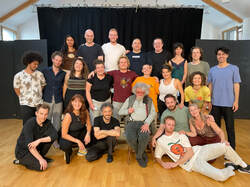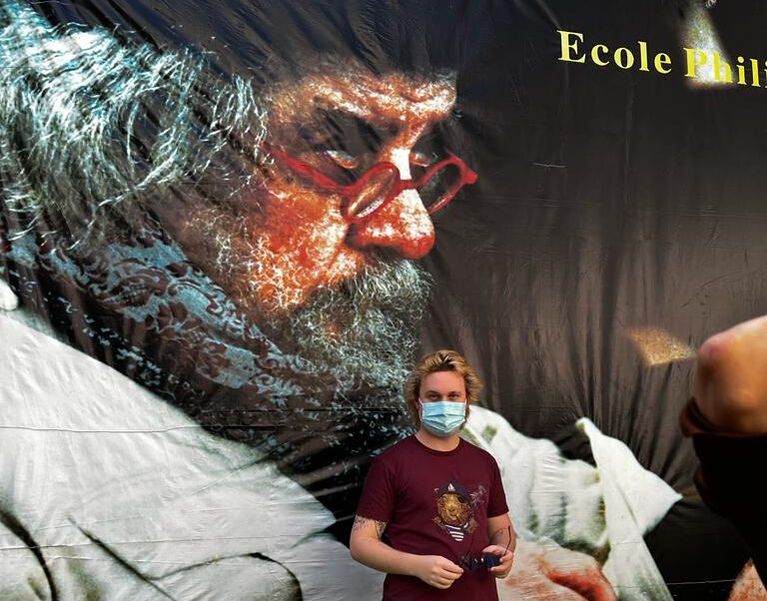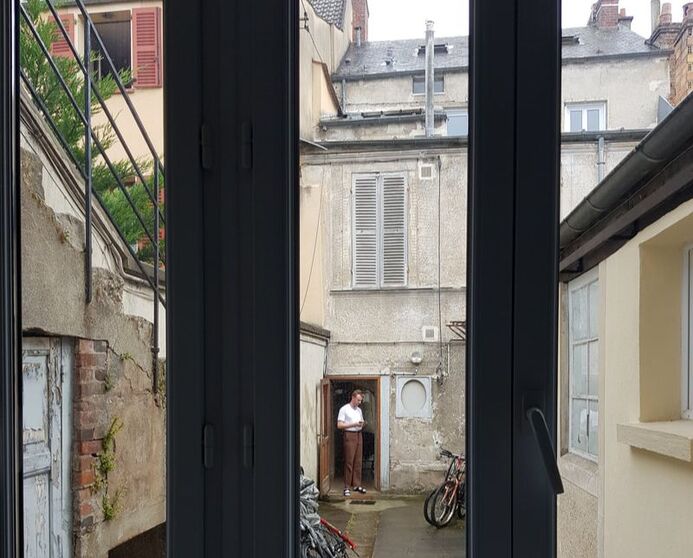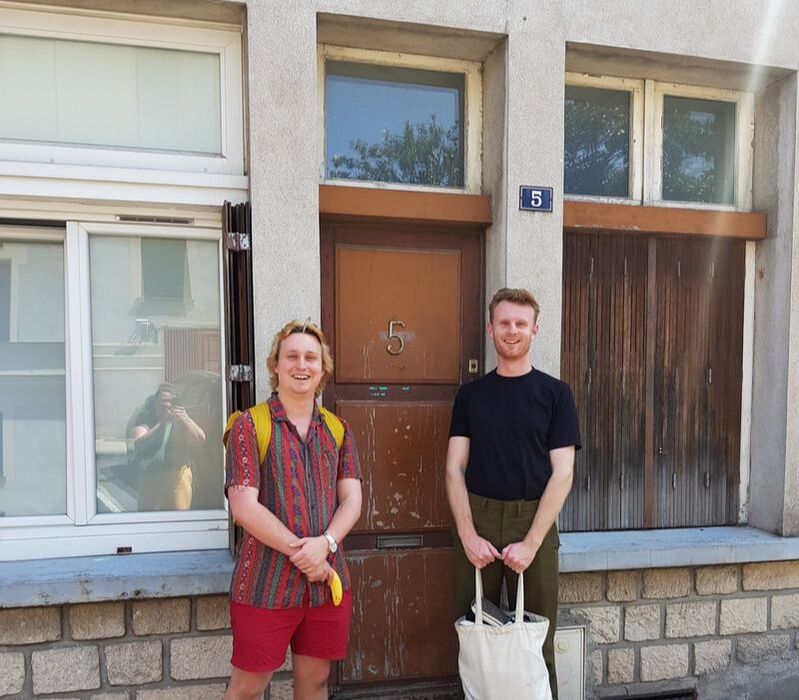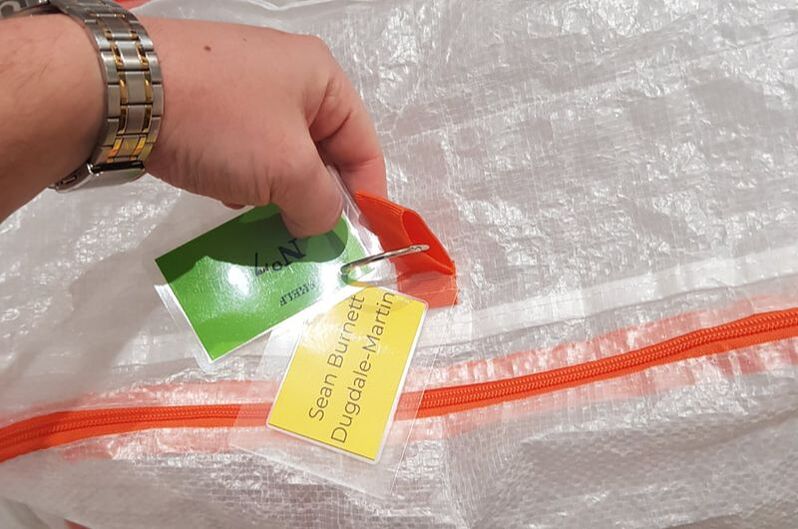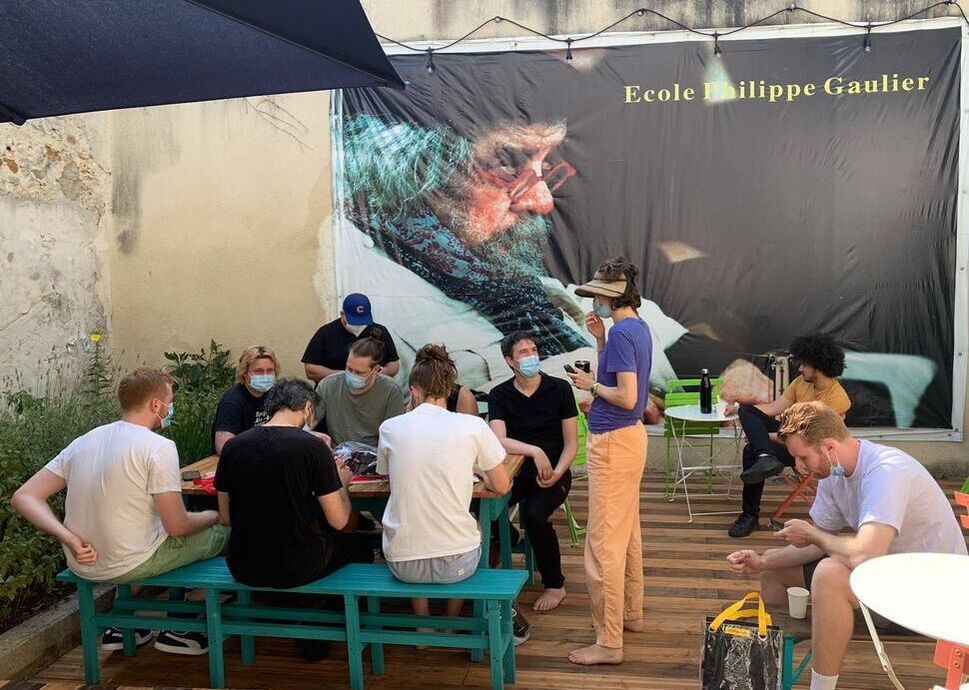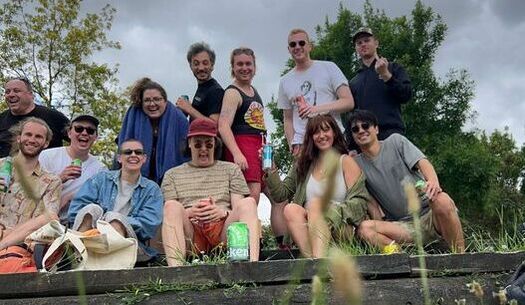Sean Burnett Dugdale-Martin
Voiced by the author
You wake up in your AirBnB with the light streaming through the gaps in the metal roller that is down over your windows. You didn’t close it so tight that there were no gaps because then no cool air would sneak in and blow away the sweaty heat from each day. You know a heat wave in the forties is coming across other parts of Europe but for now you are enjoying a bearable mid-thirties heat in the little town of Etampes, an hour south of Paris.
Simon is already up and has provoked the coffee machine into its violent grunting, so you get up because you know he’ll make you a cup since he’s there. You like Simon a lot and when he said he was making the move from New Zealand to London, but not before stopping off at clown school in France, it made a lot of sense to join him for the stint and see him off clown-style.
We walk 5 minutes around the road to the door of the school and arrive 10:46 for an 11am start. An inconspicuous place which you nearly missed on the first day had there not been others that definitely looked confused and like they weren’t from around here. You take your shoes off in the alcove just inside the door and replace them with your ‘inside shoes’ that you brought in your bag. Into the main space you find Davide, your improv teacher, behind the counter making people coffees. Across from him is a wall covered in cubby holes, each labeled with a student. You head to yours, pull out the large zip-up plastic bag and begin organising what you need for the day and what you’ll store until the day ends. You pack what you need into a see-through plastic tote bag. You turn your phone to silent and leave it in the cubby since you aren’t allowed to take it in with you and you don’t want any calls or alarms going off for whoever is around.
You walk through the room and out into the small courtyard where other classmates are chatting. To your right are two large workshop spaces one on top of the other. You use the one upstairs and you like it better because there is more natural light. It feels more pleasant than the downstairs one which the afternoon group use. Just before class, Gibum comes out and rings the metal bell on one of the walls of the courtyard to tell us to get up there and get ready. Gibum is a student working for his stay by ringing that bell, making salads for the students every Monday and Friday, and otherwise helping Michiko and Philippe run the school.
You walk through the room and out into the small courtyard where other classmates are chatting. To your right are two large workshop spaces one on top of the other. You use the one upstairs and you like it better because there is more natural light. It feels more pleasant than the downstairs one which the afternoon group use. Just before class, Gibum comes out and rings the metal bell on one of the walls of the courtyard to tell us to get up there and get ready. Gibum is a student working for his stay by ringing that bell, making salads for the students every Monday and Friday, and otherwise helping Michiko and Philippe run the school.
Every day you make sure that before the class starts proper you walk around each corner of the room and try to notice something new about the space. Richard, your movement instructor, begins the class at 11am sharp by banging the huge gong in a corner of the room. Movement class goes for two hours and is very intense for an asthmatic away from home. You regulate yourself during each activity but notice remarkable improvement every day. You notice you can run more, sweat more, dance more, give more each day into the course and wish you were here longer than your two weeks.
Lunch is at 1pm and since today is Friday you are offered salad, bread, cheese, some dried meats as well as iced coffee. For the food, it’s €2 and an extra euro for the drink. If you don’t have cash on you they put it on your tab and you pay up at the end of the course. The food is always delicious. Over lunch you and your classmates chat about what just happened and make sure to write comprehensive notes of each activity done and why you did it. Soon you will all be heading back to your homes - New Zealand, England, Italy, Finland, South Africa - and each of you have a drive to preserve the knowledge given here.
Every day you make sure that before the class starts proper you walk around each corner of the room and try to notice something new about the space. Richard, your movement instructor, begins the class at 11am sharp by banging the huge gong in a corner of the room. Movement class goes for two hours and is very intense for an asthmatic away from home. You regulate yourself during each activity but notice remarkable improvement every day. You notice you can run more, sweat more, dance more, give more each day into the course and wish you were here longer than your two weeks.
Lunch is at 1pm and since today is Friday you are offered salad, bread, cheese, some dried meats as well as iced coffee. For the food, it’s €2 and an extra euro for the drink. If you don’t have cash on you they put it on your tab and you pay up at the end of the course. The food is always delicious. Over lunch you and your classmates chat about what just happened and make sure to write comprehensive notes of each activity done and why you did it. Soon you will all be heading back to your homes - New Zealand, England, Italy, Finland, South Africa - and each of you have a drive to preserve the knowledge given here.
One-thirty is improv class and today you have Philippe running the class today. Davide runs three of the improv classes in a given week since Philippe is much older now and does not have the patience or energy for students every day. In class you sit with everyone else beside Philippe and his drum as he gets two people up and explains an activity. The students try their best to do the activity and inevitably Philippe beats his drum and begins what seems like a genuine question but which also inevitably turns into an insult. You laugh but also spend time mentally piecing together how this exercise fits into the larger curriculum of the course. You notice that each day builds off the last but Philippe and his teachers don’t tell you very much about what they want from you. When you have seen enough of others performing, you take yourself up onto the stage and do your best. Today you are given the nickname ‘the gigolo’ because you are loving and charming and generous with your scene partner but only while you are on stage together. When the drum is beaten you are no longer in love. You take this as a compliment from a world leader and it goes straight to your head.
Class ends at 3:30 and as you exit the upstairs room the afternoon class is having their lunch. You say hello, chat to a few fellow students, and some days you warn them about Philippe’s mood. From here you go back to your cubby and get changed out of your sweaty clothes.
The pub that we all go to has large, cheap drinks for clown students. The owner of the place is always happy to serve the motley pack from Philippe’s school and is often coming around taking pictures with different students for the establishment’s Facebook page. He is a very wholesome French man who does not speak a lot of English, nor does he need to.
The smoking area out the back of the pub is almost always exclusively for clown students. If there is anyone else there, any locals, you notice that they begin to clear out when they realise who is being so loud. When you have the courtyard to yourselves you pull all the plastic tables into a line and sit along both sides with drinks, vapes, cigarettes, and any food people bought or brought. The sun sets at 10:30ish in the evening and you find time whisks by while you talk absolute shit with people from all over the globe who are in town for the same reason as you. Here, you build the relationships that change the masterclass from just Simon and yourself, to a community of artists also getting brutally bullied by an aged clown. You all start sharing stories. Someone from the afternoon class shares that Philippe said he looked like he murdered twenty women in a basement and you laugh because he kinda does. You will often remember being in this courtyard and wish you were still there. When it gets late, you and Simon decide to go find some takeaway food since everyone is going up to an old castle on the edge of town to enjoy the Friday night. You lie to yourself that you’re not going to be up too late since you have plans to go to Paris in the morning.
The pub that we all go to has large, cheap drinks for clown students. The owner of the place is always happy to serve the motley pack from Philippe’s school and is often coming around taking pictures with different students for the establishment’s Facebook page. He is a very wholesome French man who does not speak a lot of English, nor does he need to.
The smoking area out the back of the pub is almost always exclusively for clown students. If there is anyone else there, any locals, you notice that they begin to clear out when they realise who is being so loud. When you have the courtyard to yourselves you pull all the plastic tables into a line and sit along both sides with drinks, vapes, cigarettes, and any food people bought or brought. The sun sets at 10:30ish in the evening and you find time whisks by while you talk absolute shit with people from all over the globe who are in town for the same reason as you. Here, you build the relationships that change the masterclass from just Simon and yourself, to a community of artists also getting brutally bullied by an aged clown. You all start sharing stories. Someone from the afternoon class shares that Philippe said he looked like he murdered twenty women in a basement and you laugh because he kinda does. You will often remember being in this courtyard and wish you were still there. When it gets late, you and Simon decide to go find some takeaway food since everyone is going up to an old castle on the edge of town to enjoy the Friday night. You lie to yourself that you’re not going to be up too late since you have plans to go to Paris in the morning.
The Specifics
The Business
If I had to give a rough ball-park figure of how much the trip cost it would be between $8,000-$9,000 and knowing what I know now, it wouldn’t be that expensive again. My partner, Tyler, came with me and we paid $9.1k for return flights for the two of us (approx. $4.6k each) but we went through a travel agent and after putting together another budget for a Creative New Zealand (CNZ) round to send me back to clown school in June/July 2025 flights (incl. flight insurance) come to around $3.5k each. Accommodation was split amongst Simon, Tyler, and I and I believe came to around $700 each for three weeks. The course was €1,200 so around $2,000 NZD. A train pass for the month cost €86 (around $150 NZD) and then dailies (food, drinks, and whatever else) could be around $50 NZD a day (which is plenty) and I was there for 21 days so $1,050 on dailies. Here is my new budget for the next trip I hope to take.
How did I save?
I am very lucky because I am a high school teacher and that I get my salary every fortnight all year round. This means I can budget accurately. I am also a maths teacher so numbers do not scare me. I broke my income ($1,616) down from what I knew was coming in each fortnight into set accounts: rent and bills ($512.50), food ($160), car finance ($312.50), France savings ($400). This budgeting left me with around $231 to keep me occupied each fortnight in spending money so I didn’t go dipping into my other accounts. Food is an account I treated differently: instead of always putting in $160 I would top up to $160 each fortnight which meant some fortnights I had more spending money but was covering all my costs and savings the same amount (I am the best).
To save $8k with $400 a fortnight would take 20 fortnights (40 weeks) which is about 10 months. My goal to go back in June ’25 would mean I would need to start saving around August this year. From there, I know that you need to pay a 10% deposit for the course in advance but you only need to pay the full fee in the weeks leading up to it. So I would plan out milestones of when I need to pay things. I took my flight prices from flight listings in June 2024, so I would aim to have enough money to book flights in January 2025. I would then book accommodation after a few more payments had been paid and I had enough, perhaps in March. Then the last thing to pay in advance is the course which could be paid for in May. If you plan well, you can break down the stress of needing all the money right now to cover everything. It is not very likely that you will ever have all the money right now. Work with your pay cycles, not against them.
What was it like living in the town?
Very nice! AirBnB’s are all very livable. Michiko, Philippe’s wife who runs the school, has a list of good places to stay and a list of places to avoid. Everything is within walking distance: the pool, the stream, the restaurants, the grocery store, and the school, so you don’t really need a car. We were there in July and it was very hot most days. The people are very friendly but I was told that the French really liked New Zealanders and kind of hated the British and the Americans so I made sure to sew a New Zealand flag into my backpack and wear a shirt with a giant kiwi holding an NZ flag just for good measure. I would recommend the Île-de-France transport pass for a month which is $150 but does get you on any train, tram or bus around Paris, even the one out to Etampes. This was a lifesaver when we took the wrong tram and had to take another one back which would have been hell had we been paying for a new ticket each time. One less thing to worry about!
What was the course culture like? Did they teach in English?
They did teach in English! France has the Lecoq School of Clowning and Performance and that is taught in French which is why there are never really any French students at Gaulier’s school.
Philippe is a sweet old man who plays the role of a demented and brutal teacher. It is a persona that he wears and in that persona he tells jokes to get a reaction. Some of these jokes are sexist, racist, and ableist. I felt safe because I am assigned male at birth and I am still very male-presenting so I never felt singled out or threatened by the joke or the vibe in the room. I also felt safe because having spent so much time at the pub with other students, I learnt early on that most of the class is queer. This changed how I perceived Gaulier’s more problematic insults and helped me put my political correctness aside for the duration of the class since we all know they are inappropriate jokes, we wouldn’t make those jokes, but we’re here and we paid him thousands of dollars to be here, in his school. I didn’t let these jokes be a roadblock for me like they normally would back home because I wanted to get the most out of the course and not be distracted by trying to change the mind of an 80-something year old who is keen on riling people up. Not every joke was an offensive joke but if you do find these challenging and could see these diminishing your experience then definitely think twice about going. You won’t get as much out of the course considering how much effort it takes to get there.
Other than that, everyone at the school is sweet, kind and funny. At the end of the course, Philippe will shake your hand and say goodbye. He genuinely loves his students. It is a shame that some drop out part way through the course but perhaps it’s for the best.
At the end of the course, while he was shaking peoples hands, Philippe leaned in and spoke something to whoever he was shaking hands with. Simon was ahead of me and I could see that Simon laughed because of what Philippe said. When it came to my turn, we shook hands and I said “Thank you, Philippe,” and he said “Ahh, monkey,” which made me laugh. It was only at the pub afterwards that we discerned he said the same thing to everyone, but a classmate clarified: Philippe hadn’t said monkey, he said ‘mon coeur’ and we each had laughed in his face.
